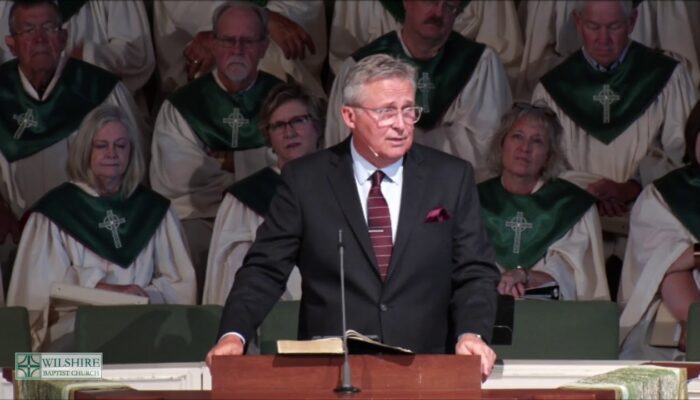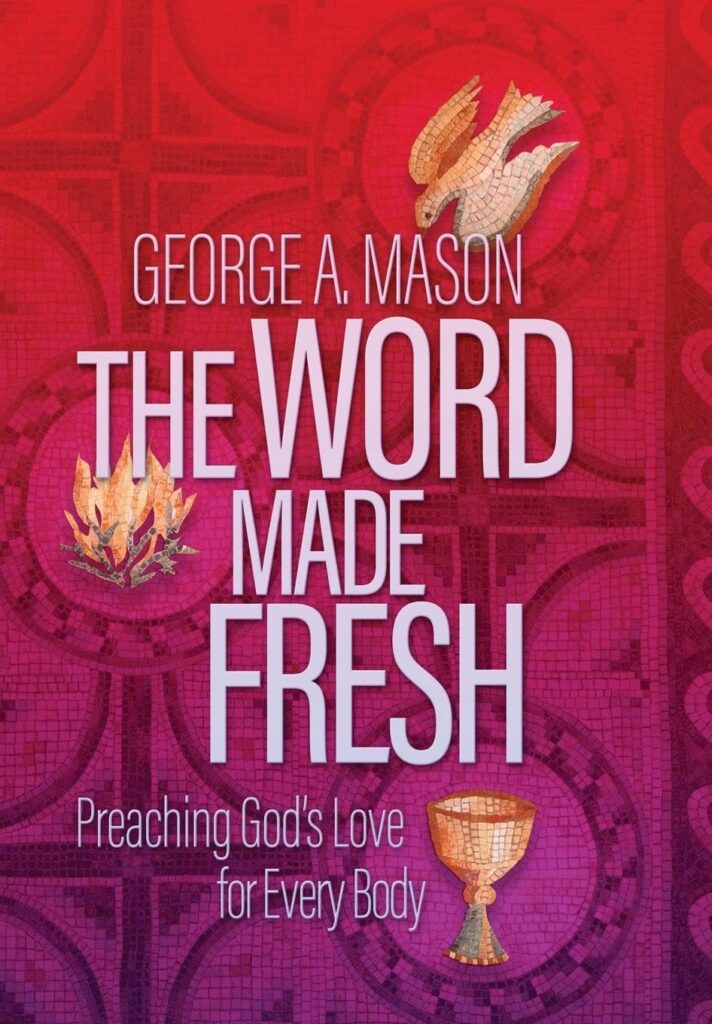
‘The Word Made Fresh: Preaching God’s Love for Every Body’ by George A. Mason: Canton, Michigan, Front Edge Publishing, 2023

Reviewed by Walter B. Shurden
Over the years, people often asked if I enjoyed my theological education, now more than 60 years in the past. My stock response: “I couldn’t wait to get up in the morning to see what they were going to say next.”
I felt that way about these 80-plus sermons of Dr. George Mason. I couldn’t wait to turn the page to see what he was going to say next.
I never read a book of sermons that I do not think of Clyde Fant, that teacher of preachers extraordinaire. “What makes a good sermon?” I asked him. “Go for the text and go for the life,” he said quickly, as though he had been asked a thousand times.
“Go for the text.” Preachers learned in seminary to call that exposition. Synonyms are explication, interpretation and elucidation. The best and most common synonym of all is explanation. George Mason excels at being “a biblical explainer.” I wish I had counted the times in these sermons when he would quote a biblical text, then ask, “What could this possibly mean?” or “So, what should we make of what Jesus told this man?” Mason asks the question that he knows his hearer is asking. Good preaching anticipates. It anticipates the questions floating around in the pews. Sometimes using his Greek, occasionally his Hebrew, but most often his common sense and spiritual insight, George Mason explains clearly both familiar and knotty biblical passages. He never bores with Biblical facts, persons or events. His Bible lives.
“Go for the life.” The word here is application. In real estate, it is “location, location, location.” In preaching, it is “application, application, application.” It is the most difficult part of sermon making, as well as the greatest weakness in much contemporary preaching. Ministerial bookshelves are lined with commentaries that tell the preacher how to interpret the text. And if the preacher lacks books, she can go online and be staggered by the endless explanations of the meaning of a text.
In seminary they taught us how to understand the text. They did not teach us how to apply the text. They didn’t because they couldn’t. They did not know what tragedy would strike our congregations, what evil would stalk the nation, or what war would engulf our world. If George Mason gets a solid A for explaining, he gets an A++ for application. His ability to tie life to lectionary, context to text, and what’s happening to what’s happened is one of the delightful strengths of these sermons.
Superb preaching takes so many things. But two unsuspected traits of superior preaching are wisdom and backbone. George Mason did not have courses in seminary in either Wisdom 101 or Backbone 101. Those courses were not in the curriculum. Wisdom! Mason preached for 33 years at Wilshire Baptist Church in Dallas, Texas. Underline it: Thirty-three years! No pastor stays for 33 years without wisdom. Mason used humor wisely. Wisely, he practiced authentic pastoral care, the kind that legitimates prophetic preaching on Sunday morning. He dedicated the babies, baptized the youth, and buried the elderly. They knew that he loved them. And he circulated among interfaith circles in the Dallas community as a wise Christian witness. His kind of wisdom was never a synonym for compromise, and never appears to be a calculated strategy for keeping the wolves at bay. He had backbone.
Backbone! It takes courage to preach what Jesus preached. Love above law, forgiveness rather than revenge, generosity over greed, nonviolence instead of violence, inclusion rather than exclusion — try preaching that with specific applications to a local congregation and then calculate the personal and institutional cost. Backbone saturates George Mason’s sermons. He preached prophetically, but one gets the impression it was never with a pointed index finger, never with a lack of love. He demonstrated that backbone is not the same as meanness.
 There are over 80 sermons in the book, divided into 12 parts, indicating the diversity of Mason’s preaching. The 12 parts are as follows: theology, Christian faith and formation, the mission of the church, Christian civility, calling and vocation, pastoral care, stewardship, Baptist roots, ecumenism and interfaith, peacemaking and nonviolence, faith in the public square, and benediction. Mason based most of his sermons on the Revised Common Lectionary, but he was not chained to it. Fortunately, an index of the biblical texts is placed at the back of the book, a most helpful feature for lectionary preachers.
There are over 80 sermons in the book, divided into 12 parts, indicating the diversity of Mason’s preaching. The 12 parts are as follows: theology, Christian faith and formation, the mission of the church, Christian civility, calling and vocation, pastoral care, stewardship, Baptist roots, ecumenism and interfaith, peacemaking and nonviolence, faith in the public square, and benediction. Mason based most of his sermons on the Revised Common Lectionary, but he was not chained to it. Fortunately, an index of the biblical texts is placed at the back of the book, a most helpful feature for lectionary preachers.
These 12 parts of the book reveal something of who this preacher is. He is theologian-in-residence, mentor in both faith formation and ministerial formation, missiologist, healer of souls, advocate of generosity and nonviolence, rooted denominationalist who works both ecumenical and interfaith ground, and prophet on public issues.
One is not surprised that Mason often has too much good stuff in one sermon. See, for example, his sermon on the man born blind in John 9 or the idea of freedom in Acts 16. On more than a few occasions, Mason had at least two sermons in the one that he presented. This may be one of the weaknesses of lectionary preaching, as one skates over more than one text.
One is surprised at Mason’s deep, deep well. I do not know another book of sermons by a Baptist preacher where literature, movies, sports, poetry, art, science and nature play such a prominent role. But one hears no apology from Mason, for he believes these are “sacramental fields where truth, goodness and beauty may be unearthed.” Gary Simpson called these sacramental fields “George’s friends.”
Teasing out theological themes from these sermons one easily discerns what could be called “Georgeology.” Among those themes would be the following: God is love; God is for Every Body; God sides with the least and the last; Christ brings richness to life; faith is personal but not private; science is an ally to faith, calling out the called; hope rather than fear is the way forward.
Additionally, Mason works out of one of the best and broadest definitions of the gospel that I have ever read: “The gospel is God’s redemption narrative from creation to consummation: beginning and continuing through the people of God—Israel, revealed most clearly in Jesus, and including now the Church.” While reading these sermons I kept thinking of the words of Rumi who said, “Everything has to do with loving and not loving.” Loving is the essence of “Georgeology.”
Here are some one-liners.
- “It’s easy to confess Jesus is Lord until it calls on you to question every other loyalty.”
- “An occupation is something you can do; a vocation is something you can’t not do.”
- “The line between good and evil runs down the center of every human heart. It is not a line drawn in the sand that separates one people from another.”
- “Bad things can make you better or bitter.“
- “Forgiveness is not burying the hatchet in the back of your offender.“
- “You can’t have an inclusive community in which inclusion means only likeness or like mindedness.”
- “We condemn Christian nationalism in the strongest possible terms. We repudiate the use of the name of Christ in defending violence, to undermine the work of the people, and to claim that somehow America is the rightful property of Christians.”
The earliest model of Baptist theological education was personal rather than institutional. A seasoned minister would take a yearling minister under his care and teach essential elements of the pastoral role. Many ministers and churches know George Mason primarily because of his passion and success for calling out the called, his affirmation and preparation of young people for the ministry. Wilshire’s ministry under Mason’s leadership confirms a long-held conviction that spiritually vibrant churches naturally produce priests and prophets. Mason has mentored numbers of young preachers directly through his pastoral residency program at Wilshire. Happily, this book will continue Mason’s spectacular ministry of mentoring, if only young (and old) preachers will read and study these sermons. A promise to preachers: read and study one of these sermons every day for 80 days; put into practice what you read, and you will become a better preacher.
It is no secret that a terrible unrest plagues the ministry these days. Many have left. Many others want out. One gets a completely different feel from George Mason. He said that ministry is “an affair of the heart.” He preached these sermons to a congregation that he loved deeply. He said to them one Sunday morning “I don’t know when I feel more alive than when I’m standing here before you.” What words for a Christian preacher!
I once heard someone say that sermon books are vanity books. Preachers prancing, they said. In a sense most books can be said to be vanity books. But you need to know that this is no vanity book. The idea for the book came not from Mason, but from his long-time colleague, Doug Haney. It was edited not by Mason, but by four people who know Mason well. And the book itself was produced to mark Mason’s long tenure with the Wilshire Baptist Church.
If you are not careful, you will miss the title of the book. I did. I took a quick look at the cover and for several days into reading the book I thought the title was The Word Made Flesh. Ordinary theological title for a preaching book, I thought, with an emphasis on the incarnation. It was one of those cases where I assumed I knew what the following word was to be, and I missed a very crucial consonant. But it is The Word Made Fresh! So apt! So very, very good! Mason freshens things: old religious language, stale interpretations, theological silliness, interfaith witness, the Bible itself. But he especially freshens the relevance of the Bible to our time.
[Full disclosure: George Mason is chair of the board of this magazine. I have seen and heard him preach maybe three times in person. I think I have been in his presence three times. While friends, we are not in each other’s closest circles.]
— Walter B. Shurden is Minister at Large at Mercer University, is a frequent contributor to Christian Ethics Today, a friend and mentor to preachers, Baptist historian, and a connoisseur of good preaching.
Leave a Reply
You must be logged in to post a comment.


